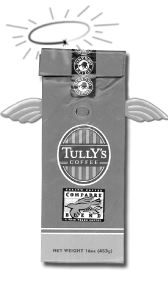ONE OF THE MOST enduring images from last year’s WTO was of protesters smashing in the window of a downtown Starbucks.
But, hey, no hard feelings.
In the year since, Starbucks has actually gone on to embrace, at least to a degree, some of the principles advanced by the protesters. In October, the company for the first time introduced so-called “fairly traded” coffee for sale at its stores. The new Latin American blend is certified by an organization called TransFair USA, which links importers with farmer cooperatives and insures that farmers are paid a premium price for their goods.
“Fair trade” was one of the rallying cries for WTO opponents, who see “free trade” as a force for Third World exploitation. Starbucks has long argued that by expanding the market for high-quality beans and supporting charity work in the countries where it buys coffee, the company is already helping to improve coffee economics. But this spring, just days before Global Exchange, an economic justice group that was a principle instigator of WTO protests, planned to begin picketing Starbucks stores, the giant retailer took the additional step of agreeing to buy at least some fairly traded beans.
This was a major victory since coffee is the second most heavily traded commodity in the world (after oil). And while there are a number of smaller coffee brands in the United States, such as Equal Exchange, which have been fair-trade pioneers, Starbucks is obviously the most visible coffee retailer in North America. “Starbucks has 10 million customers a week,” notes Paul Rice of TransFair USA. “That’s a huge opportunity to get the message out.” Each package of Starbucks’ Fair Trade blend carries information about the fair trade issue and about Rice’s organization.
There’s no particular amount Starbucks has agreed to buy, and the agreement will be reviewed next October. As Rice notes, “if they’re not making money, it’s not sustainable.” A spokeswoman for Starbucks could not give specific sales data on the product (which sells for $11.45 a pound, about the midrange for Starbucks) but would say only that the company was “pleased” with its performance. Starbucks is also offering Fair Trade to colleges and universities for which it provides coffee service—more than 30 institutions are buying in.
Tully’s too has embraced fair trade—earlier and with even more enthusiasm than its local rival. The Seattle-based company started selling Compadre blend in August with a huge marketing push, including Compadre posters filling the windows of every store. Tully’s has done a triple PC whammy with Compadre: It’s fairly traded, organic, and shade-grown! (Shade-grown is good for the birds.) Robert Dattala, the company’s director of coffee, says Compadre is “doing very, very well”—a report confirmed by store personnel downtown—despite the fact that it costs $3 more per pound than other Tully’s blends.
Next year, fittingly enough, yet another Seattle company is going to be the first to come out with certified fairly traded tea. Granum, which makes the Choice Organic brand sold in natural markets and some Safeways and QFCs, will have fairly traded leaves on retail shelves by spring.
The company buys mostly from large tea estates in India and Sri Lanka, according to purchaser Eric Ring. Under the fair-trade program, Granum pays a certain price over the standard rate, with the excess funds used to benefit workers. (TransFair’s job, in part, is to make sure that happens as promised.) Ring says the change will likely mean an increase in retail prices, though not immediately. “Awareness of this issue, especially since the WTO, has blossomed,” says Ring. “It would be great if it pushed sales up, but mainly, it fits with what we want to do.”
Not all Choice flavors will be fairly traded, however. Peppermint tea, for example, “is not a fairly traded item,” says Ring. “We buy that from Eastern Washington.”








